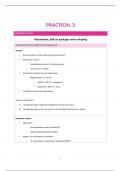Samenvatting
Summary Oplossing practicum 3 tot 5 - data mining
Complete oplossing (en opgave) van practicum 3 tot 5 in het engels. Ook samenvatting van de bijhorende ppt. Bevat codes en screenshots van de oplossingen in R. Alles is heel snel en makkelijk vindbaar en duidelijk onderverdeeld in de verschillende practica. Dit is het deel dat op het eindexamen ...
[Meer zien]



